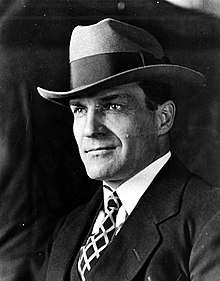Erle V. Painter
Erle Vansant Painter (December 20, 1881 – September 1968), or Doc,[1] was an American chiropractor and athletic trainer for the Boston Braves (1929) and New York Yankees (1930–1942). He also helped direct the Brooklyn YMCA,[2] and was a professor at Florida Southern College.[3] Due to his role as trainer for the Yankee organization he was credited with "modernizing training methods for professional athletes".[4]
Erle Vansant Painter | |
|---|---|
 | |
| Born | December 20, 1881 |
| Died | September 1968, aged 86 |
| Nationality | American |
| Occupation | Chiropractor Athletic trainer |
| Known for | New York Yankees trainer 1930-1942 |
Early life
Erle Painter was born in Iowa in 1881 to parents John Albert Painter and Ella May (née) Humphrey. He attended Springfield College in Massachusetts, and later the New York School of Chiropractic (not related to the present-day New York Chiropractic College) where he graduated in 1920.
Career
In 1917, as director of the Brooklyn YMCA, Painter was mustered into the army and given the rank of chief master in arms in order to help train soldiers in the first naval hospital unit.[5] As chief master in arms Painter drilled the students in hospital-related activities such as the creation of improvised litters (or rescue baskets), and the loading of wagons for transportation of wounded soldiers. Upon the conclusion of the year long course, Painter was mustered back out of the army.[5]
New York Yankees
Painter began working as the Yankees trainer in 1930, replacing the previous doctor Albert A. Woods. In 13 years with the Yankees, Painter would treat many prominent players such as Babe Ruth,[6] Lou Gehrig,[7] and Joe DiMaggio—whose foot he accidentally burned at the beginning of the 1936 season with a diathermy machine.[8][9] He was described as "one of the most valuable men on the Yankee pay roll"[10] and was credited with helping many players recover back to performance shape.[11]
In 1942, Painter was dismissed without explanation from the position as trainer by manager Joe McCarthy.[12] While no reason was given to Painter for his dismissal, some headlines debated if he was blamed for losing the 1942 World Series.[13]
Many years following his dismissal, surrounding the debate of Babe Ruth's called shot, Painter shared his version of the story with the Baseball Hall of Fame stating, "Ruth made a three-quarter turn to the stands and held up one finger. It was plain he was signifying one strike didn't mean he was out. Root put over another strike and the Babe repeated the pantomime, holding up two fingers this time. Then, before taking his stance, he swept his left arm full length and pointed to the centerfield fence."[14]
Post-Yankees
Following his leave of the Yankees, Painter became a professor at Florida Southern College, in Lakeland, Florida.[3][15]
During his time in Florida, Painter joined physical trainer Jesse O'Brien in opening a sports health center in St. Petersburg, Florida.[16]
Personal life
Painter married Fanchon Fagin in 1909 with whom he had one child, Erle Vansant Painter Jr.
His second wife was Eleanora Virginia Buckley, whom he married in 1925.
Painter was one of the first chiropractors to be inducted into the American Chiropractic Association Sports Council Hall of Fame.[17]
References
- "Bambino May Play on Sunday". The Morning Call. July 21, 1932. Retrieved 3 September 2018 – via Newspapers.com.

- "Baseball Trainer To Speak Before Area Chiropractors". Democrat and Chronicle. Jun 4, 1947. Retrieved 3 September 2018 – via Newspapers.com.

- Schultz, Loren (October 5, 1940). "Sportlets". Iowa City Press-Citizen. Retrieved 3 September 2018 – via Newspapers.com.

- Rehm, WS (1980). Who was Who in Chiropractic: A Necrology (2nd ed.). Littleton, CO: Who's Who in Chiropractic, International.
- Dunster, Edward Swift; Foster, Frank Pierce; Hunter, James Bradbridge; Sajous, Charles Eucharist de Medicis; Stragnell, Gregory; Klaunberg, Henry J.; Martí-Ibáñez, Félix (1917). International Record of Medicine and General Practice Clinics. MD Publications. pp. 702–703. Retrieved 3 September 2018.
- "Ruth Hurt as Yanks Win, 12-7". Daily News. April 7, 1930. Retrieved 3 September 2018 – via Newspapers.com.

- "Baseball's Most Famous Invalid". Daily News. July 21, 1932. Retrieved 3 September 2018 – via Newspapers.com.

- Cramer, Richard Ben (2013). Joe DiMaggio: The Hero's Life. Simon and Schuster. pp. 85–86. ISBN 9781439127988. Retrieved 3 September 2018.
- Graham, Frank (2002). The New York Yankees: An Informal History. SIU Press. pp. 223–224. ISBN 9780809324149. Retrieved 3 September 2018.
- Jenkins, Jeff. "Babe Ruth's Chiropractor". www.chirotexas.org. Retrieved 3 September 2018.
- Gould, Alan (April 20, 1935). "Sport Slants". Harrisburg Telegraph. Retrieved 3 September 2018 – via Newspapers.com.

- "Doc Painter Is Dismissed By Yankees". Tampa Bay Times. October 15, 1942. Retrieved 3 September 2018 – via Newspapers.com.

- "Maybe Trainer Lost the Series". The News-Messenger. October 15, 1942. Retrieved 3 September 2018 – via Newspapers.com.

- Atkin, Ross (10 April 1980). "BASEBALL Ruth lore: fact or fiction?". Christian Science Monitor. Retrieved 3 September 2018.
- "Yankee Trainer Now College Prof". The Post-Register. October 13, 1940. Retrieved 3 September 2018 – via Newspapers.com.

- "Experience Key Talent Of New Spa Operators". Tampa Bay Times. October 3, 1943. Retrieved 3 September 2018 – via Newspapers.com.

- "American Chiropractic Association Sports Council in Arlington, VA". www.acasc.org. Retrieved 3 September 2018.